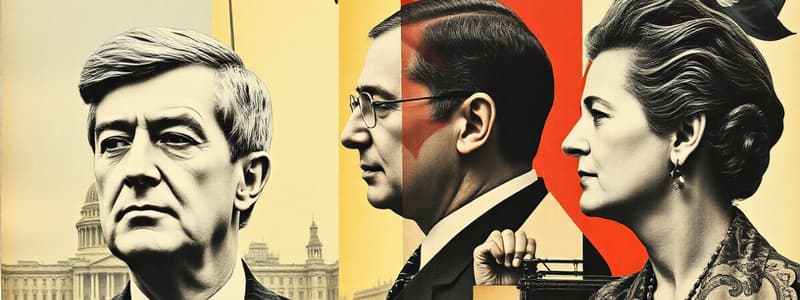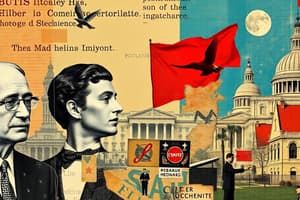Podcast
Questions and Answers
Which political thinker advocated for a classless society and authored the Communist Manifesto?
Which political thinker advocated for a classless society and authored the Communist Manifesto?
- John Stuart Mill
- Karl Marx (correct)
- John Maynard Keynes
- Adam Smith
Which economist believed in government intervention for economic stability during both boom and bust phases?
Which economist believed in government intervention for economic stability during both boom and bust phases?
- John Stuart Mill
- Adam Smith
- John Maynard Keynes (correct)
- Thomas Hobbes
Who is known as the father of capitalism and advocated for minimal government intervention in markets?
Who is known as the father of capitalism and advocated for minimal government intervention in markets?
- Thomas Hobbes
- Karl Marx
- Adam Smith (correct)
- John Stuart Mill
Which philosopher emphasized the importance of limiting government power while also advocating for individual rights and social reforms?
Which philosopher emphasized the importance of limiting government power while also advocating for individual rights and social reforms?
Which political philosopher viewed the dictator as a necessary figure to maintain order and prevent chaos?
Which political philosopher viewed the dictator as a necessary figure to maintain order and prevent chaos?
Which political ideology primarily seeks significant, rapid, and often revolutionary changes?
Which political ideology primarily seeks significant, rapid, and often revolutionary changes?
Which ideology is associated with support for a mixed economy and social justice?
Which ideology is associated with support for a mixed economy and social justice?
What is a primary characteristic of conservative ideology?
What is a primary characteristic of conservative ideology?
Reactionaries primarily seek to achieve what aim in politics?
Reactionaries primarily seek to achieve what aim in politics?
What is the primary economic approach of democratic socialism?
What is the primary economic approach of democratic socialism?
Which ideology is characterized by the absence of private property and emphasis on collective ownership?
Which ideology is characterized by the absence of private property and emphasis on collective ownership?
Which of the following best describes democratic capitalism?
Which of the following best describes democratic capitalism?
Which political ideology tends to advocate for higher taxes on the wealthy to support social programs?
Which political ideology tends to advocate for higher taxes on the wealthy to support social programs?
What characterizes fascism as a governmental structure?
What characterizes fascism as a governmental structure?
Which of the following best describes direct democracy?
Which of the following best describes direct democracy?
What is a primary characteristic of dictatorship?
What is a primary characteristic of dictatorship?
Which statement accurately represents liberalism principles?
Which statement accurately represents liberalism principles?
What role does propaganda play in fascist regimes?
What role does propaganda play in fascist regimes?
What is one consequence of the War Measures Act in Canada?
What is one consequence of the War Measures Act in Canada?
How does the principle of proportional representation differ from first-past-the-post?
How does the principle of proportional representation differ from first-past-the-post?
What is a defining feature of a majority government?
What is a defining feature of a majority government?
What is the primary function of the judicial branch in Canada?
What is the primary function of the judicial branch in Canada?
What is a consequence of a vote of non-confidence in government?
What is a consequence of a vote of non-confidence in government?
What distinguishes the role of the Governor General in Canada?
What distinguishes the role of the Governor General in Canada?
What are controlled elections typically associated with in a dictatorship?
What are controlled elections typically associated with in a dictatorship?
Which of the following is a drawback of representative democracy?
Which of the following is a drawback of representative democracy?
What best describes the economic governance under fascism?
What best describes the economic governance under fascism?
Flashcards
Radicals
Radicals
Individuals or groups seeking significant, rapid, and revolutionary changes, often associated with extremes on the political spectrum.
Liberals
Liberals
Support moderate progress and reform, favoring a mixed economy, social justice, and individual rights. Often believe in government intervention to ensure fairness and equality.
Conservatives
Conservatives
Prefer traditional values and practices, opposing rapid change, and wanting to preserve societal structures. Often emphasize family values, law & order, and cultural heritage. May favor free-market capitalism, limited government intervention, and fiscal responsibility.
Reactionaries
Reactionaries
Signup and view all the flashcards
Communism
Communism
Signup and view all the flashcards
Democratic Socialism
Democratic Socialism
Signup and view all the flashcards
Democratic Capitalism
Democratic Capitalism
Signup and view all the flashcards
Right-leaning
Right-leaning
Signup and view all the flashcards
Communism (Karl Marx)
Communism (Karl Marx)
Signup and view all the flashcards
Capitalism (Adam Smith)
Capitalism (Adam Smith)
Signup and view all the flashcards
Keynesian Economics (John Maynard Keynes)
Keynesian Economics (John Maynard Keynes)
Signup and view all the flashcards
Classical Liberalism (John Stuart Mill)
Classical Liberalism (John Stuart Mill)
Signup and view all the flashcards
Leviathan (Thomas Hobbes)
Leviathan (Thomas Hobbes)
Signup and view all the flashcards
Dictatorship
Dictatorship
Signup and view all the flashcards
Democracy
Democracy
Signup and view all the flashcards
Direct Democracy
Direct Democracy
Signup and view all the flashcards
Representative Democracy
Representative Democracy
Signup and view all the flashcards
Fascism
Fascism
Signup and view all the flashcards
Treaty
Treaty
Signup and view all the flashcards
Authoritarian
Authoritarian
Signup and view all the flashcards
Propaganda
Propaganda
Signup and view all the flashcards
First-past-the-post
First-past-the-post
Signup and view all the flashcards
Proportional Representation
Proportional Representation
Signup and view all the flashcards
Constituency
Constituency
Signup and view all the flashcards
Majority Government
Majority Government
Signup and view all the flashcards
Minority Government
Minority Government
Signup and view all the flashcards
Vote of Non-Confidence
Vote of Non-Confidence
Signup and view all the flashcards
Anti-Terrorism Act
Anti-Terrorism Act
Signup and view all the flashcards
Study Notes
Political Spectrum
- Radical: Favors significant, rapid, revolutionary changes. Often seen as extremists.
- Liberal: Supports moderate progress and reform. Favors a mixed economy, social justice, and individual rights. Often in favor of government intervention to ensure fairness.
- Conservative: Emphasizes traditional values, opposes rapid change to preserve structures of society. Often favors free-market capitalism, limited government intervention, and fiscal responsibility. Prioritizes family values, law and order, and cultural heritage.
- Reactionary: Seeks to reverse political, social, or economic changes, aiming to restore previous systems and often opposing progress or reform. May support authoritarianism or nationalism.
Left vs. Right
- Left: Believes in an equal society, advocating significant government involvement in peoples' lives. Tends to support higher taxes for the wealthy, welfare for the poor, and business regulation. Favors government intervention during recessions (economic downturns).
- Right: Emphasizes individual freedom and limited government involvement. Supports lower taxes, less business regulation, and believes private sector competition leads to better services. Favors free markets .
Ideologies
- Communism: Strong government control, no private property, classless society, shared resources, centralized planning, and focus on equality.
- Democratic Socialism: Limited government intervention, but embraces policies like universal healthcare, free education, and labor protections, while accepting a capitalist market with a safety net.
- Democratic Capitalism: Market-based economy with private ownership, free markets, and competition driving economic activity. The government maintains rule of law.
- Fascism: Authoritarian, dictatorial government led by a single leader or party with dictatorial control of the economy and society. Strong nationalism, militarism, and suppression of dissent. Allows private property and business but with alignment to state goals.
Forms of Democracy
- Direct Democracy: Citizens directly participate in decision-making (e.g., town hall meetings, referendums). Impractical for large populations.
- Representative Democracy: Citizens elect representatives to make decisions on their behalf (e.g., Canada, USA). Efficient for larger populations but can have issues with representation, involvement, or corruption.
- Democracy: A system of governance where people hold power, either directly or through chosen representatives.
Forms of Government
- Dictatorship: One person or small group holds all power, makes decisions independently. People have little to no say.
Principles of Liberalism
- Rule of law
- Freedom of speech
- Individual rights and freedoms
- Private property
- Economic freedom
- Self-interest
- Competition
Rise of Nazism
- Treaty of Versailles' humiliation and economic devastation of Germany.
- Hitler exploited public anger and promised national pride and power.
- Widespread economic instability, poverty, and unemployment.
- A weak government.
- Effective Nazi propaganda and political maneuvering.
Characteristics of Fascism
- Nationalism
- Disregard for human rights
- Designation of enemies/scapegoats
- Military supremacy
- Sexism
- Controlled media
- National security
- Religion and government intertwined
- No labor unions
- No freedom of expression
- Cronyism & corruption
- Fraudulent elections
Characteristics of Dictatorships
- Controlled elections
- Suppression of freedom of speech
- Control of media
- Redirection of popular discontent
- Propaganda
- Lack of political opposition
- Indoctrination
- Use of force and terror
- Controlled participation
- Leader glorification
Canadian Security Laws
- War Measures Act: Grants government extensive control during emergencies, potentially limiting civil rights and controlling resources for national security.
- Anti-Terrorism Act: Criminalizes acts of terrorism, implementing preventive measures such as asset freezing, increased surveillance, and international cooperation (e.g., no-fly lists).
Canadian Government Structure
- Monarch's power is delegated to the Governor General, acting on Prime Minister and Cabinet recommendations.
- Executive Branch: Governor General signs laws, summons or dissolves Parliament, and appoints people. Prime Minister sets the agenda, develops policies, and chooses Cabinet members. The Cabinet creates policies and introduces laws.
- Legislative Branch: Includes the Monarch, Senate, and House of Commons. Senate is appointed, representing provinces & territories. House of Commons members represent population areas, debate, vote, participate in committees, and introduce and refine laws.
- Judicial Branch: Federal, provincial, and territorial courts. Independent from other branches.
Types of Elections
- First-Past-the-Post: Candidate with the most votes wins; the party with the majority of seats forms the government.
- Simple and accountable government.
- Can be disproportionate (not truly reflective of overall vote).
- Risk of a minority government.
- Proportional Representation: Seats distributed based on proportion of votes.
- Fair outcome.
- Increased voter choice.
- Canadian Elections: 5-year terms; constituencies elect representatives.
Types of Governments
- Majority Government: Single party wins more than half the seats.
- Minority Government: Single party controls less than half the seats but governs with other parties support.
- Vote of Non-Confidence: A vote showing lack of support for a leader or governing body.
Important Political Thinkers
- Karl Marx: Advocated for classless society and dictatorship without private property (far left).
- John Maynard Keynes: Advocated government intervention to stabilize economies (center-left).
- Thomas Hobbes: Advocated for dictatorships to maintain order(left).
- John Stuart Mill: Focused on individual rights and limited government power (center-left).
- Adam Smith: Championed free-market capitalism (right).
Studying That Suits You
Use AI to generate personalized quizzes and flashcards to suit your learning preferences.




